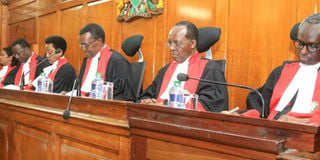For Supreme Court judges, it was a tricky balancing act

Supreme Court judges prepare to issue the ruling on the presidential election petition on November 20, 2017. They found the election to be legitimate. PHOTO | JEFF ANGOTE | NATION MEDIA GROUP
What you need to know:
- The November petition was overshadowed by sensitive political realities the judges could not ignore.
The decision by the Supreme Court on Monday to uphold the outcome of the October 26 presidential election did not come as a surprise, even in the eyes of the petitioners.
And this is not to say the electoral commission conducted the poll in a perfect manner.
But it had everything to do with the manner in which the pleadings were drafted, argued and the totality of the proceedings leading up to the verdict that affirmed President Kenyatta’s election for the second term in office.
POLITICAL CRISIS
Lawyer Waikwa Wanyoike, representing the second petitioners Njonjo Mue and Khelef Khalifa, captured the mood when, while submitting for his client, described the timing of the petition as the elephant in the room.
Would the court be so gutsy as to annul two presidential elections, however illegal, in succession?
While the lawyer thought so, and went on to urge the six judges to nullify the election if it failed constitutional and legal tests, the reality was, however, different in a country caught up in a protracted political crisis.
PETITION
In many respects, the spectre raised by Mr Wanyoike best explains the unique circumstances that confronted the judges when they sat to hear a second petition in three months.
It could be the petition died even before it was heard.
Mr Wanyoike aside, could the Supreme Court once again nullify a presidential election so soon after another one?
LEGALLY
Unlike the hearing of the August petition filed by Nasa leader Raila Odinga, the November petition was overshadowed by sensitive political realities the judges could not ignore.
The political environment was crude, arising from a deeply polarised country and it was obvious the court was going to reject the call to intervene in what had ceased being a legal problem, and was a political problem.




